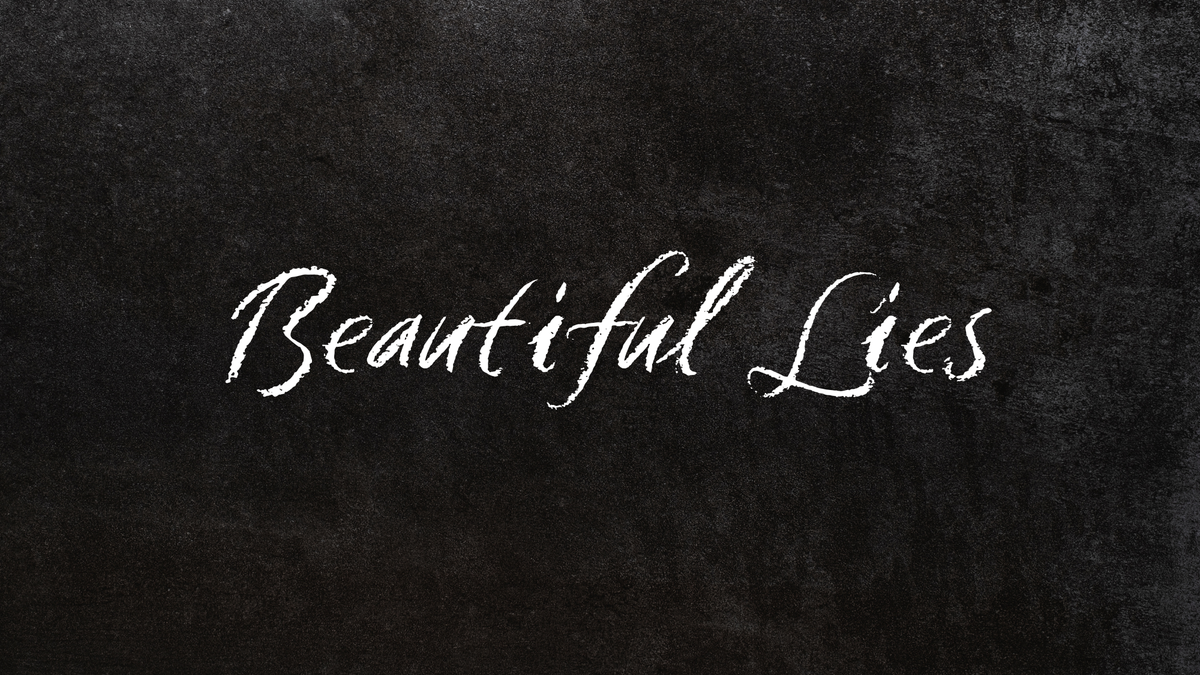Beautiful Lies
The coping skills that got me through childhood eventually became my adult goals. This is how I learned to use that without pretending I have it all figured out.

Some kids dreamed about prom. I dreamed of escape.
The sounds of my childhood were usually doors slamming and voices yelling, always my cue to disappear. Before I could tie my shoes, I knew how to read the room and listen for the tone of voice over the words being said.
That kind of hypervigilance takes its toll. To this day, I'm always just a little bit physically braced for whatever might come next, something I covered in A Long December.
I remember that same feeling in my stomach when I would hear certain footsteps or my name called in a certain way. That alone told me how my night would go.
I remember rehearsing escapes I’d never make. Accepting apologies no one ever gave and rehearsing entire arguments in my head, coming up with mic-drop responses no one ever heard.
My bedroom was the safest place in the house (which isn't saying much). My mother had me keep a jar of peanut butter with saltines under my bed for when she wasn't home, so I wouldn’t have to come out and risk running into him.
Her first husband, the man responsible for my DNA and my nightmares.
She thought it was about his temper, which was partly true, but she didn’t know the whole story.
He made me his servant. His verbal punching bag. And behind closed doors, where no one could see, he made me his dirty little secret.
He used guilt, fear, and shame to keep me quiet about the unspeakable things he did, always with threats of what might happen if I ever told anyone.
But then one day, I told someone.
It was a fourth-grade play, of all things, with a plot that was way too close to my actual life. That night, I said the things I wasn’t supposed to say to the people that I wasn’t supposed to say them to.
But even after he was gone, the damage remained: that hypervigilance never went away just because the immediate threat did.
I’ve always needed a story to keep me inspired.
When I was little, I danced in front of my bedroom mirror, holding my Ambassador curling iron like a microphone and lip-syncing to Celine, Whitney, and Tina (ah, the '80s).
When I wasn’t nailing dance routines in our grimy little garage under an imaginary spotlight, I was memorizing movie lines. Movies were predictable, where nothing bad ever happened unless the script called for it.
Real life... not so much; movies pretty much inspired my daydreams.
Because when your earliest memories are of a father whose presence did more damage than his absence ever could, daydreaming was the only way to escape to a safer, better world.
But eventually, that also became a strategy.
When I was fourteen, I earned a spot in our state's top performing arts school. It was competitive, intense, and full of talent and drama.
I loved every moment of it. I had real chops, maybe enough to make it.
But after graduation, while classmates headed off to LA, Juilliard, or some obscure theatre program in Europe, I stayed.
I let someone else’s fears talk me out of the risk, and I told myself I was being realistic.
But looking back, I know I was just scared of actually being seen and judged. That little nugget of fear hasn’t fully left me either. More on that later.
I don’t blame anyone else for the choices I made, but I’d be lying if I said I never wondered what would’ve happened if I’d chosen differently.
Instead, I got married; I deeply regret everything about that marriage except the daughter it gave me.
I used to think the "beautiful lies" were the ones I made up as a kid to get through some stuff. In hindsight, the more damaging ones came from my first husband.
Manipulation was kind of his thing, and it took me a long time to stop confusing it for love. He said allll the right things, and I believed him. I needed to.
I was barely 22. I didn't know anything about anything yet.
When we met, he was losing his sight, and I took that on like it was my responsibility. He refused to learn Braille, so I read to him, put touch dots on appliances, and helped him learn how to use his cane.
I adjusted everything around him.
Later, he got a guide dog, supposedly for independence. In reality, he just really wanted a dog. Apparently, I didn't have enough things to take care of.
To everyone else, it looked like he was becoming more independent. At home, nothing really changed; those dots stayed mostly untouched.
But it wasn't his blindness that eventually drove me away. It was everything else.
For every sweet thing he said, there were red flags I chose to ignore. I kept thinking that if I just tried harder, kept being patient, and did everything just right, his promises would eventually come true.
Looking back, it's pretty obvious that I didn't have much of a sense of self-worth. I didn’t think I could do better. I wasn’t even sure I deserved better.
He wanted to be taken care of, and I needed to be needed.
That's really all that kept us together for as long as it did.
I wanted to be a good wife, a good mom, a good person; the kind of woman who just…handles things.
So I handled things.
I handled his moods, his dog, his appointments, our daughter, our house, our jobs, and his insults. I got blamed when things fell apart and dismissed when I tried to fix them.
And every single time I said I was leaving, he’d threaten to kill himself.
Every single time, I believed him.
I begged him to come with me to couples therapy. He told me, “Going to therapy means admitting there's a problem.”
Which, ironically, might be the most honest thing he ever said.
Want the next one?
Meanwhile, I was drowning.
I didn’t stop escaping into my imagination because I'd outgrown it; I just didn’t have the headspace for it, no pun intended. My life had narrowed down to getting through the day and doing what I thought I was supposed to do.
I stopped imagining a life I actually wanted; I barely believed I was allowed to want it.
Even then, I still thought that if I were strong enough, patient enough, and selfless enough, I could fix it all and end up with a better life anyway.
I was wrong, and so damn stubborn about it.
I went to college while working full-time and running our household, convinced I could fix it all and make a better life for us.
But instead of being supportive, he got suspicious.
“You’re just going to school so you can find someone better and leave me,” he said.
Le sigh.
More red flags than a matador parade, and still I stayed.
You ever wish you could go back in time and just…smack the stupid right out of yourself? I do.
But I stayed; I was still too deep in denial to accept that my hopes were constantly being used against me.
I remember one day really clearly: I was driving down a busy road, running through my mental to-do list like I always did.
My husband had already called me several times that morning, checking in. Again. Making sure I wasn’t doing anything he wouldn't approve of.
God forbid I have a moment to myself or talk to someone who wasn’t him.
The irony was that I was swamped with responsibilities he refused to share. I barely had time to breathe, let alone cheat (which I wouldn't have done anyway).
And that's when it hit me:
This is it.
This is my life.
Nothing was going to change. The arguments, the loneliness, and the nonstop grind of taking care of everything would look exactly the same when I was fifty as they did right then.
That thought terrified me.
Not long after that, I was at a business lunch when someone asked: "So, tell me about yourself."
I had nothing.
I had no identity that didn’t involve taking care of someone else. I wasn’t a fulfilled wife. I didn’t even feel like a whole person.
I was a utility.
That's when I knew I had to leave. Not impulsively, but strategically. I wasn't going to make it through another round of tears and guilt.
So I detached.
I was still there physically, but I stopped trying to make him understand me. I stopped engaging and reacting. I was just...there.
They call that gray rocking now, and he noticed almost immediately, of course. He accused me of not loving him anymore.
I mean, he wasn't wrong. I hadn't loved him for a long time. By then, all I felt for him was resentment.
"I don’t want to be in this marriage anymore," I told him, my voice flat. I didn't even bother to pretend to be sad about it.
I just couldn't do it anymore.
The promise I made to myself that kept me strong enough to do what I had to do was that I wouldn't live like this anymore.
And that’s when he suggested couples therapy.
By then, it was too late. That ship had sailed, and I was already gone.
Of course, the first thing he asked was "Is there someone else?" As if he couldn’t imagine that he might be the reason I was done.
And despite everything, I still struggled with the decision. I had taken my vows seriously. I had made promises before God, and I hung in far long than I should've trying to fix something that never should have existed.
I even sat down with my minister because I was so conflicted. Among other things, he told me: “Divorce can be a blessing; God doesn’t want His children to suffer".
That conversation gave me much-needed clarity.
Back to the conversation:
After I told him I was done, he made those same threats to himself again. But this time, what used to guilt me into staying just pissed me right off.
Because I finally saw them for what they were: a last-ditch attempt to regain control.
So I called his bluff. I’m not proud of what I said, but I made it clear I wasn't falling for the act anymore.
Was it harsh? Maybe. But I'd spent years ignoring red flags, taking his abuse, and feeling guilty for wanting out of a marriage to a 'helpless' blind man. I wasn't willing to live with the expectation that I'd sacrifice myself indefinitely.
That was the moment it stopped working.
Because even then, especially then, I was the only one thinking about what was best for our daughter, and I needed him to know I wasn’t buying his bullshit anymore.
Don't worry, he’s still very much alive.
Probably still waiting on that Oscar.
After we separated, his relatives left me voicemails calling me selfish and basically telling me to “do my job.” They yelled about who was going to take care of him now.
Like I was hired help or something.
The truth is, they knew who they'd raised. They just didn't want to deal with it until it became their problem.
But I had a daughter watching all of this, and I wasn't about to let her grow up thinking that this was what love looked like.
That was my line in the sand.
I thought the divorce would be the end of it, but it wasn't, at first.
Even after it was final, he kept calling, supposedly about visitation but really just to keep access to me. For a while, I let him.
Part of me wanted him to see how much better I was doing (I really wasn't).
Another part wanted him to finally acknowledge me. I had no interest in getting back together; I just wanted to feel validated by him.
Codependency is a bitch to get over, after all.
But eventually, I remember thinking, “Didn’t I pay a lot of money to not have to deal with this anymore?”
I realized the divorce hadn't magically fixed my problems. I had to set boundaries and actually keep them. And that is what finally ended it.
Slowly, I found my way back to that version of me who imagined more from life and leaned into it.
After years of surviving a relationship that nearly broke me, I stopped believing the lie that wanting more for myself made me greedy or foolish.
I stumbled around in that age-old quest to 'find myself'. I didn’t even know what I liked anymore, so I tried new things, even stuff that felt ridiculous and I completely sucked at.
I didn't care; I felt so far behind, and I was in a mad dash to catch up on a life I hadn't gotten to live and learn from yet.
Eventually, I stopped waiting for things to be perfect or for myself to be "ready" and just started acting as if I were.
That was the beautiful lie that changed my life.
These days, I still live in my head, probably more than I should. The difference is, now I use those visions to level up my life instead of escaping it.
If I want to be strong and self-sufficient in my old age, I have to show up for myself. If I want peace in my home, I have to be the one to create it. If I don't want the damage I grew up with to become a family tradition, then I have to be the one who stops it.
I wish I could say my actions are strictly noble. But sometimes it's just stubbornness. Either way, it works.
When I used to run marathons (okay, mostly halves, but whatever), I didn’t much care about the medals. I cared about proving I could finish when everything in me wanted to quit.
I realize saying “when I used to run marathons” is obnoxious. I promise I’m working on it.
And now, after ten years of digging out of brutal winters, I've decided I'm moving somewhere that doesn't even sell snow shovels.
Not maybe, it’s gonna happen.
I picture the daily details of that life, and I make choices as if that life already exists. In my mind, it does, but I just haven’t caught up to it yet.
Same tool, new direction.
Lately, I've been thinking a lot about the future, especially the big, audacious goals that still make me nervous. When I was eighteen, I’d internalized this idea that big, ambitious dreams were for better people - thinner, prettier, richer, smarter people.
So I built a life around what felt realistic instead.
Now, when doubt creeps in, and I think I can’t possibly do this, I ask myself one question:
“What if I can?”
That question has taken me farther than I ever imagined, and I'm not done. Not even close. I want to take the life I scraped together and turn it into something remarkable, even if some part of me still wants to crawl under my desk every time I hit “publish”.
You can't create something unique and stay invisible. I've tried. Every time I chose safety over visibility, I went nowhere, and for too long, I only lived in my dreams.
Now I turn them into reality.
If you'd like to support the work, here's where to do it.
If this made sense to you, subscribe. If it didn’t, maybe the next one will.
I am nothing if not versatile.
Related Reads:
- If you’ve dealt with spoken or unspoken lies, read The Silence Was a Choice.
- The escape method I used in daydreams is in Movies: Escape or Compass?
- For the career curveball that made my life better, see The Best Thing I Never Got.
Heather Papovich is the voice behind Unfinished Business, a weekly essay series where real life meets pop culture, and how to get through both without (mostly) losing it.




